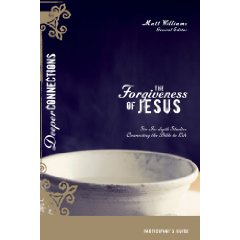 The Deeper Connections series has hit its stride, and in this particular set of three DVDs there is a conscious effort to reach the Emerging Church movement and provide it with better Biblical resources. This is evident from the addition of the two female contributors to the series– Margaret Feinberg who introduces the series and has already been seen as a leader in that movement, and then the presence of Susan Hecht as well, long a worker with Campus Crusade and the very sorts of audiences that are making up Emerging Churches of various sorts. Considering how broken our world, and indeed the world within the church is, it is not a surprise that this DVD focuses on the Forgiveness of Jesus. There seems to be more need for it now than ever. And it must be said that this DVD presents us with stronger presentations, better exegesis, and indeed deeper connections between the Biblical text and the current situation than the one on the Life of Jesus. It should prove to be a very good tool not only for teaching but for pastoral counseling as well.
The Deeper Connections series has hit its stride, and in this particular set of three DVDs there is a conscious effort to reach the Emerging Church movement and provide it with better Biblical resources. This is evident from the addition of the two female contributors to the series– Margaret Feinberg who introduces the series and has already been seen as a leader in that movement, and then the presence of Susan Hecht as well, long a worker with Campus Crusade and the very sorts of audiences that are making up Emerging Churches of various sorts. Considering how broken our world, and indeed the world within the church is, it is not a surprise that this DVD focuses on the Forgiveness of Jesus. There seems to be more need for it now than ever. And it must be said that this DVD presents us with stronger presentations, better exegesis, and indeed deeper connections between the Biblical text and the current situation than the one on the Life of Jesus. It should prove to be a very good tool not only for teaching but for pastoral counseling as well.
Once again in this video Gary Burge’s presentations really stand out as clear, crisp, Biblically relevant and well connected to the setting in which we find him. I was especially taken with his connecting of Jesus as the Sent one with the stress in John 9 on Jesus sending the man born blind to the pool called Sent (specifically identified as such) to get healing. And it was great to see the cleaned up site in Jerusalem where the Pool of Siloam has been found in recent years. The visuals reinforce the message in various ways.
Matt Williams treatment of the parable of the prodigal son is helpful in various ways, and he connects the story well to his own faith journey. Darrell Bock’s presentation, in the Holocaust Museum moves us well beyond theoretical discussions of forgiveness to the story of Corrie ten Boom who practiced costly forgiveness. Susan Hecht’s presentation is clear enough, but you can tell she is just learning how to do such presentations on camera. Mark Strauss has a very congenial on camera presentation and this episode in the series is certainly just as strong as his previous ones. Scott Duval’s presentation is however not as strong as the one he did in the Life of Jesus video, and unfortunately some of the things he says about early Jews and early Judaism vis a vis forgiveness and the Law do not really reflect the state of what we know about the ancient Pharisees and their law keeping. It sounds a bit more like traditional Protestant readings of these texts with the usual discussions about legalism, hypocrisy, and no discussion of covenantal nomism, unfortunately. A healthy dose of reading A.J. Levine, Ed Sanders, and Jacob Neusner would have helped. Nevertheless, this is an excellent resource, much to be commended for Bible study and Sunday School use.
I want to reiterate that the visuals in these videos are excellent. The first segments of each of the six sessions could be used all by themselves to talk about locations in the Holy Land where Jesus was. I was especially taken with the filming in front of the famous ‘reflective bean’ in downtown Chicago used as a backdrop for Gary Burge’s presentation. It was extremely effective.
I could have wished actually for more in depth discussion of Mt. 18.21-22 especially in light of Gen. 4.24. When Jesus tells Peter he must forgive not merely 7 times but 77 times, there is a deliberate echo of the bloodthirsty cry of Lamech who was planning to take 77 fold vengeance thereby outdoing Cain in exacting revenge. The forgiveness Jesus talks about has a direct social consequence when enacted. It is not merely a matter of a private inward spiritual effect on an individual who is forgiven. On the contrary, real forgiveness breaks the cycle of revenge taking, the cycle of reprisals. Real forgiveness leaves justice and vengeance in the hands of God and does not engage in the reciprocity and retaliation conventions so common in Jesus’ world and ours.
Perhaps what is needed is not merely an emphasis on the deeper spiritual connections in the text but also on the wider social and behavorial implications as well. We could have used some more discussion on the miraculous nature of forgiveness. It is not natural as a human response, its supernatural. As such it is not an inherent possibility for fallen persons apart from God’s grace. And the spirit of forgiveness in Jesus’ ministry is not merely “forgive your enemies. It will badly confuse them”. It is actually, love your enemies and pray for those who persecute you. Release them from their rage and wrath against you. As Henri Nouwen long ago said, in the Lukan portrait of Jesus, Jesus does not say ‘into thy hands I commend my spirit’ before he forgives his tormentors from the cross. Jesus’ forgiveness is not just for the repentant. It is not just for the disciples or his family. It is even for his enemies who hung him on that cross. Such a forgiveness is not a normal human possibility, but it can be a grace enabled one. And as such it bears witness to the miraculous life-transforming nature of the Good News.

